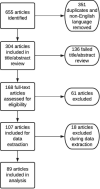Identifying requisite learning health system competencies: a scoping review
- PMID: 35998963
- PMCID: PMC9403130
- DOI: 10.1136/bmjopen-2022-061124
Identifying requisite learning health system competencies: a scoping review
Abstract
Objectives: Learning health systems (LHS) integrate knowledge and practice through cycles of continuous quality improvement and learning to increase healthcare quality. LHS have been conceptualised through multiple frameworks and models. Our aim is to identify and describe the requisite individual competencies (knowledge, skills and attitudes) and system competencies (capacities, characteristics and capabilities) described in existing literature in relation to operationalising LHS.
Methods: A scoping review was conducted with descriptive and thematic analysis to identify and map competencies of LHS for individuals/patients, health system workers and systems. Articles until April 2020 were included based on a systematic literature search and selection process. Themes were developed using a consensus process until agreement was reached among team members.
Results: Eighty-nine articles were included with most studies conducted in the USA (68 articles). The largest number of publications represented competencies at the system level, followed by health system worker competencies. Themes identified at the individual/patient level were knowledge and skills to understand and share information with an established system and the ability to interact with the technology used to collect data. Themes at the health system worker level were skills in evidence-based practice, leadership and teamwork skills, analytical and technological skills required to use a 'digital ecosystem', data-science knowledge and skill and self-reflective capacity. Researchers embedded within LHS require a specific set of competencies. Themes identified at the system level were data, infrastructure and standardisation; integration of data and workflow; and culture and climate supporting ongoing learning.
Conclusion: The identified individual stakeholder competencies within LHS and the system capabilities of LHS provide a solid base for the further development and evaluation of LHS. International collaboration for stimulating LHS will assist in further establishing the knowledge base for LHS.
Keywords: HEALTH SERVICES ADMINISTRATION & MANAGEMENT; Health informatics; Quality in health care.
© Author(s) (or their employer(s)) 2022. Re-use permitted under CC BY-NC. No commercial re-use. See rights and permissions. Published by BMJ.
Conflict of interest statement
Competing interests: None declared.
Figures
Similar articles
-
Leaders' perspectives on learning health systems: a qualitative study.BMC Health Serv Res. 2020 Nov 26;20(1):1087. doi: 10.1186/s12913-020-05924-w. BMC Health Serv Res. 2020. PMID: 33243214 Free PMC article.
-
Evaluation Methods, Indicators, and Outcomes in Learning Health Systems: Protocol for a Jurisdictional Scan.JMIR Res Protoc. 2024 Dec 6;13:e57929. doi: 10.2196/57929. JMIR Res Protoc. 2024. PMID: 39642369 Free PMC article.
-
Adapting an Interdisciplinary Learning Health System Framework for Academic Health Centers: A Scoping Review.Acad Med. 2022 Oct 1;97(10):1564-1572. doi: 10.1097/ACM.0000000000004712. Epub 2022 Jun 7. Acad Med. 2022. PMID: 35675482
-
Exploring Patient Journey Mapping and the Learning Health System: Scoping Review.JMIR Hum Factors. 2023 Feb 27;10:e43966. doi: 10.2196/43966. JMIR Hum Factors. 2023. PMID: 36848189 Free PMC article.
-
The use and role of digital technology in learning health systems: A scoping review.Int J Med Inform. 2023 Oct;178:105196. doi: 10.1016/j.ijmedinf.2023.105196. Epub 2023 Aug 14. Int J Med Inform. 2023. PMID: 37619395
Cited by
-
Evaluation of an experiential training program in patient-centered outcomes and comparative effectiveness research for diverse researcher communities and health care organizations.J Clin Transl Sci. 2023 Mar 15;7(1):e81. doi: 10.1017/cts.2023.36. eCollection 2023. J Clin Transl Sci. 2023. PMID: 37125064 Free PMC article.
-
Implementing Learning from Excellence in a postanaesthesia care unit: a qualitative study of healthcare professionals' experiences after six months.BMC Health Serv Res. 2025 Apr 2;25(1):493. doi: 10.1186/s12913-025-12626-8. BMC Health Serv Res. 2025. PMID: 40176056 Free PMC article.
-
Enhancing capacity for primary care research in cancer survivorship: National Cancer Institute meeting report.J Natl Cancer Inst. 2025 May 1;117(5):827-832. doi: 10.1093/jnci/djae276. J Natl Cancer Inst. 2025. PMID: 39499169 Free PMC article.
-
Enrichment of core competencies to maximize health system impact: An analysis of an embedded research training program.Learn Health Syst. 2023 Oct 23;8(2):e10399. doi: 10.1002/lrh2.10399. eCollection 2024 Apr. Learn Health Syst. 2023. PMID: 38633024 Free PMC article.
-
Qualitative study of international key informants' perspectives on the current and future state of healthcare quality measurement and feedback.BMJ Open. 2023 Jun 7;13(6):e073697. doi: 10.1136/bmjopen-2023-073697. BMJ Open. 2023. PMID: 37286326 Free PMC article.
References
-
- A Learning Health System Activity, Roundtable on Value and Science-Driven Health Care, Institute of Medicine . Observational studies in a learning health system: workshop summary. Washington (DC: National Academies Press (US), 2013. https://www.ncbi.nlm.nih.gov/books/NBK201307/ - PubMed
Publication types
MeSH terms
LinkOut - more resources
Full Text Sources
Miscellaneous




